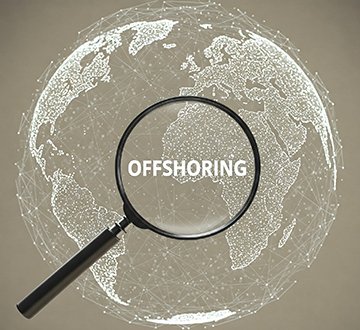Published: May 15, 2015 | Updated: September 18, 2025
Published: May 15, 2015 | Updated: September 18, 2025
Decoding Offshoring: A Comprehensive Analysis
 In this article, we'll decode "offshoring" with a comprehensive analysis. In today's interconnected world, this concept and practice has become a familiar term in the business lexicon. It represents a strategic move where companies choose to delegate specific tasks or entire processes to teams located in other countries.
In this article, we'll decode "offshoring" with a comprehensive analysis. In today's interconnected world, this concept and practice has become a familiar term in the business lexicon. It represents a strategic move where companies choose to delegate specific tasks or entire processes to teams located in other countries.
While the initial allure often lies in potential cost reductions, the reality of offshoring has several nuances, presenting a spectrum of advantages and disadvantages that can significantly impact a company's operations and long-term success. Read on for the intricacies of offshoring, its potential benefits, and drawbacks across various business functions. We will pay particular attention to the realm of software development and customization, examining the specific pros and cons of venturing offshore in this critical area.
Furthermore, we will highlight the compelling reasons why certain technologies, such as Computerized Maintenance Management Systems (CMMS), might be best kept onshore, emphasizing the potential risks associated with their offshore management.
The Upsides of Taking Work Across Borders
Financial Gains: The Allure of Lower Costs
One of the most frequently cited reasons for a company to consider offshoring is the potential for significant financial savings. While a substantial factor, this goes beyond reduced wages. When a company moves certain operations to a country with a lower cost of living, it can benefit from decreased expenses across the board.
Think about it. You have lower salaries, but so too can the cost of office space, utilities, and even taxes. This can free up capital for reinvestment in other areas of the business, such as research and development, marketing initiatives, or expanding into new markets. For businesses operating on tight margins or those looking to scale rapidly, these initial cost reductions can appear incredibly attractive.
Access to a Global Talent Pool
Beyond just cost, offshoring can open doors to a much wider pool of talent than companies might find domestically. Certain countries have developed specialized expertise in particular fields. For example, a company might find a large concentration of highly skilled engineers or programmers in a specific region overseas. This access to specialized skills can be invaluable, especially when you have either a competitive domestic talent market or a lack of the specific expertise needed for a particular project. By tapping into this global talent pool, companies can potentially find individuals with unique skill sets and perspectives that can drive innovation and improve the quality of their products or services.
Increased Operational Flexibility and Scalability
Offshoring can also provide businesses with greater operational flexibility. For instance, companies might choose to offshore customer support functions to take advantage of different time zones, offering round-the-clock service to their global customer base. This can significantly enhance customer satisfaction and provide a competitive edge.
Furthermore, offshoring can offer scalability. If a company experiences rapid growth and needs to quickly expand its workforce, engaging with an established offshore team can be a faster and more efficient way to scale operations compared to the often lengthy process of hiring and training a large domestic team.
Focus on Core Competencies
By offloading non-core activities, such as manufacturing or certain IT functions, companies can concentrate their internal resources and efforts on their core competencies–the activities that truly differentiate them in the marketplace. This allows management to focus on strategic initiatives, product development, and strengthening their competitive advantage. By entrusting peripheral tasks to external partners, the core team can dedicate its energy and expertise to what it does best, potentially leading to greater innovation and efficiency in those critical areas.
The Downsides of Sending Work Abroad
Communication Challenges and Cultural Differences
Offshoring has the potential for communication breakdowns. Language barriers can lead to misunderstandings, delays, and errors. Even when employees use a shared language, subtle cultural differences in communication styles, work ethics, and expectations can create friction and impede collaboration. These differences can impact everything from project timelines to the overall quality of work. Building effective communication channels and fostering cultural understanding requires significant effort and investment in training and relationship building.
Quality Control and Monitoring Issues
Maintaining consistent quality poses a challenge when work performed crosses geographical boundaries. Distance can make it difficult to directly oversee production processes or monitor the quality of services being delivered. While you can implement contractual agreements and service level agreements (SLAs), ensuring adherence and addressing quality issues can be more complex and time-consuming when dealing with offshore teams. This can lead to inconsistencies in product quality, customer dissatisfaction, and ultimately, damage to a company's reputation.
Data Security and Intellectual Property Risks
Entrusting sensitive data or intellectual property to offshore partners introduces potential security risks. Different countries have varying data protection laws and enforcement mechanisms. Companies need to carefully vet their offshore partners, implement stringent security protocols, and understand the legal frameworks in the countries where their data will be handled. Failure to do so can result in data breaches, theft of intellectual property, and significant financial and legal repercussions.
Potential for Hidden Costs and Long-Term Expenses
While the initial cost savings of offshoring can seem appealing, companies often discover hidden costs and long-term expenses that can erode these initial advantages. These can include the costs associated with travel for in-person meetings, managing time zone differences, resolving communication issues, rework due to misunderstandings, and the expenses related to ensuring quality control.
Fluctuations in exchange rates and potential political or economic instability in the offshore location can introduce unforeseen financial risks over time. What initially appeared to be a cost-effective solution might eventually become more expensive than domestic alternatives.
Impact on Domestic Workforce and Public Perception
Offshoring decisions can have a negative impact on the domestic workforce, resulting in job losses and decreased morale among remaining employees. This can also affect a company's public image and brand reputation, particularly if the offshoring customers perceive the move as prioritizing cost savings over local employment. Negative public perception can lead to boycotts, difficulty in recruiting domestic talent, and damage to customer loyalty. Companies need to carefully consider the potential social and ethical implications of their offshoring strategies.
Discover how streamlined maintenance processes can elevate production. Learn more.
Offshoring Software Development and Customization: A Closer Look
Many of the same benefits from above pertain to this industry.
- The allure of lower development costs.
- Access to a large pool of technically skilled individuals in certain regions.
- The ability to leverage different time zones can enable faster project completion through round-the-clock development cycles.
- For certain types of projects with well-defined specifications, offshoring can provide a scalable and seemingly economical solution.
However, offshoring software development comes with its own set of challenges.
- Communication breakdowns due to language barriers and cultural differences can lead to misunderstandings of requirements, resulting in code that doesn't meet expectations or requires significant rework.
- Maintaining code quality and ensuring adherence to coding standards can pose a difficulty with teams geographically dispersed.
- Time zone differences can also hinder real-time collaboration and problem-solving.
- Protecting intellectual property and ensuring data security when offshore teams handle sensitive code and project information.
- Similar to above, you have the potential for hidden costs associated with travel, rework, and managing remote teams.
 Why Avoiding Offshoring CMMS Technology Might Be Wise
Why Avoiding Offshoring CMMS Technology Might Be Wise
Computerized Maintenance Management Systems (CMMS) often deeply integrate into a company's core operations, managing critical assets, maintenance schedules, and operational workflows. Offshoring the development or significant customization of such a system can introduce considerable risks.
The intimate knowledge of internal processes and specific equipment requirements enhances successful CMMS implementation and customization. Relying on an offshore team that lacks this deep understanding can lead to a system that doesn't accurately reflect the company's needs, resulting in inefficiencies, errors in maintenance scheduling, and potential downtime of critical equipment.
Companies want data security in a CMMS, as these systems often contain sensitive information about asset performance, maintenance history, and operational costs. Keeping this data within a trusted domestic environment can mitigate the risks associated with data breaches and regulatory compliance issues.
Furthermore, the need for ongoing support, updates, and customizations often requires close collaboration and responsiveness. Think of the challenges of achieving this with a geographically distant team. The potential for miscommunication and delays in addressing critical maintenance-related issues could have significant financial and operational consequences.
Beyond Borders: Navigating the Complexities of Global Work
The decision to offshore any business process demands a thorough evaluation of potential benefits against inherent risks. Don't boil everything down to chasing lower costs. It requires a strategic understanding of a company's core needs, the nature of the work being considered for offshoring, and the potential long-term implications.
The global landscape of work continues to evolve, presenting both opportunities and challenges for businesses seeking to optimize their operations and reach new heights. Navigating this complex terrain requires careful consideration, clear communication, and a deep understanding of the nuances involved in working across borders and cultures. Ultimately, the most successful offshoring strategies are those that prioritize not just immediate cost savings, but also long-term value, quality, and the cultivation of strong, collaborative partnerships, regardless of geographical distance.
With Mapcon Technologies, everything happens in-house. Programming, integration, customization, and customer support: All U.S.-based. Call 800-922-4336 to discover what a world-class CMMS with local development can do for your maintenance management success.
FAQs
What is offshoring in business?
Offshoring is when companies delegate certain tasks or processes to teams in other countries, often to reduce costs, access specialized talent, or increase flexibility.
What are the main benefits of offshoring?
Companies often see lower operational costs, access to global talent, improved scalability, and the ability to focus on core business strengths while outsourcing non-core functions.
What challenges can arise with offshoring?
Communication barriers, cultural differences, quality control issues, hidden costs, and risks to data security are common challenges companies face when moving operations abroad.
Is offshoring software development a good idea?
It can provide cost savings and faster development cycles but also carries risks such as coding inconsistencies, time zone delays, and intellectual property concerns.
Why might offshoring CMMS technology be risky?
Because CMMS integrates deeply with core operations, relying on offshore customization may lead to inefficiencies, data security risks, and slower response times for critical maintenance needs.
How does MAPCON approach CMMS development differently?
Unlike offshore providers, MAPCON keeps programming, customization, and customer support U.S.-based, ensuring secure data handling, accurate system customization, and responsive support.
MAPCON CMMS software empowers you to plan and execute PM tasks flawlessly, thanks to its wealth of features and customizable options. Want to see it for yourself? Click the button below to get your FREE 30-day trial of MAPCON!
Try It FREE!